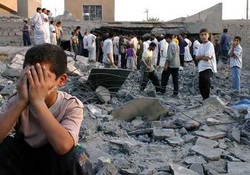 Dozens of people killed in Syria, 32 of them children. And we in America are scandalized, horrified, naming the deaths barbaric, a crime against humanity. What we aren't considering is our part in the world's suffering.
There were 4,487 US military fatalities during the war in Iraq. We have to search to find out how many fatalities the allied forces have suffered. And how many civilians were killed in a war that we brought to a country that had not attacked us, and who was not an imminent threat to our security. 106,765-116,627, is the estimate given for civilian deaths in Iraq due to our 2003 invasion. Add to these the number of both military troops and civilians who were injured or maimed, and the sobering fact that every 80 minutes a veteran of either Iraq or Afghanistan commits suicide. Every 80 minutes. Our war dead are not all slayed on the battlefield. Having a husband who retired from the Air Force, having moved from home to home, from state to state in support of his career, having raised five children in military housing, having stood in a make-shift military chapel with a military chaplain chanting the Liturgy, having a son who served in the Army, I know what the commitment to country means. I know what sacrifice means, and I do not take either lightly. On this Memorial Day, I suspect the ultimate sacrifice of our war dead is being whitewashed by a half-asleep American population who will watch endless car races, grill hamburgers, boat, swim and water ski, and gather less in memory of our dead, than in celebration of having a day off from work. And what does war have to do with writing poetry? Everything. If we write as a means to understand our actions, our desires, our hatreds as well as our loves, then poetry and war go hand in hand. The most vulnerable, most disturbing, the most revealing poetry is written when someone knows his or her life is in danger. Here, there is no hiding. In both Here, Bullet and Phantom Noise, Brian Turner gives us a first-hand look at the war in Iraq. A soldier’s view, as well as a poet’s. ASHBAH by Brian Turner The ghosts of American soldiers wander the streets of Bagdad by night, unsure of their way home, exhausted, the desert wind blowing trash down the narrow alleys as a voice sounds from the minaret, a soulful call reminding them how alone they are, how lost. And the Iraqi dead, they watch in silence from rooftops as date palms line the shore in silhouette, leaning toward Mecca when the dawn wind blows. from Here, Bullet http://www.amazon.com/gp/product/1882295552/ref=kinw_rke_rti_1 If I can separate the suspicious war of a misguided president from the men and women who served in it, if I can give more than lip-service to supporting the military here and overseas, I can open further to invite these men and women into my quiet, bookish world of poetry. Poetry has saved me more than once, possibly it can save them. On this Memorial Day I am reawakened to what war is, and the too-high price paid for an ill-considered war. If the fallen could speak to us from their graves, I imagine they'd remind us that our hands are stained with innocent blood too, that Syria and America are not as far apart as we like to believe, and that all violence comes from the same source. But even if they could speak, would we hear them? Approaching the Delta by Colette Jonopulos We shall find peace. We shall hear angels. We shall see the sky sparkling with diamonds. —Anton Chekov I want to be there when mourning doves glide above the river, downstream where leaves and branches snare on rocks, where deer hesitate to go further. I want to be there when this war ends, and the next, where under cover of trees we touch the wind with our nakedness. When there are no words left, only emptiness angular with hope, I want to be there. The rush of us, dense thighs and arms entwined, the world grown dark, water the only continual. Bodies buried nameless, the quiet after; the named restless still. I want to be there, near the crookneck, where water eddies, glides past in spirals, like the fingerprints of those gone, left to memory and statistics, their voices snagged in branches overhead, speaking little of fallen matter, but of water carried downstream with remnants of winter, of the swift lure of salt right before the river becomes something else.
0 Comments
Leave a Reply. |
Archives
October 2022
AuthorMy writing often deals with the environment, my poetry filled with allusions to natural and man-made disasters. I have unlimited hope though; there is just too much wonder in this world to become a defeatist. To quote Margaret J. Wheatley, '"Hopelessness has surprised me with patience." Categories |
 RSS Feed
RSS Feed
